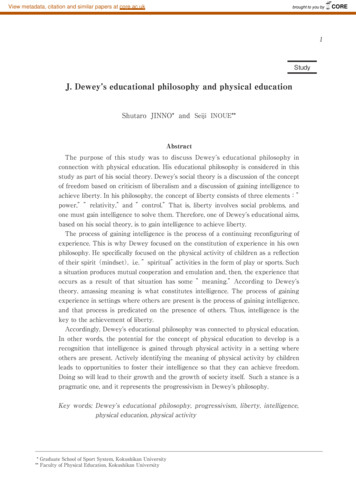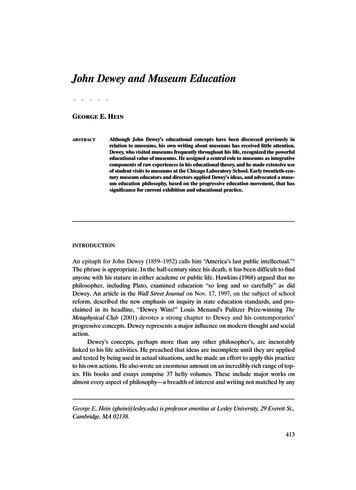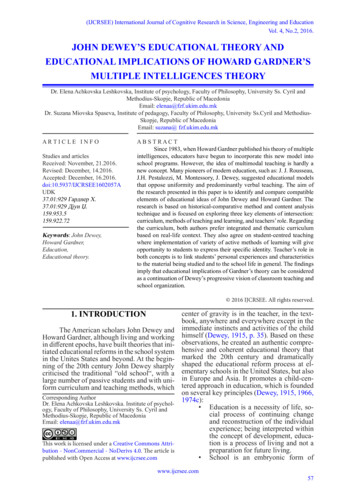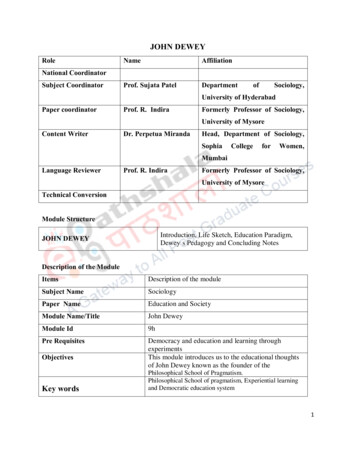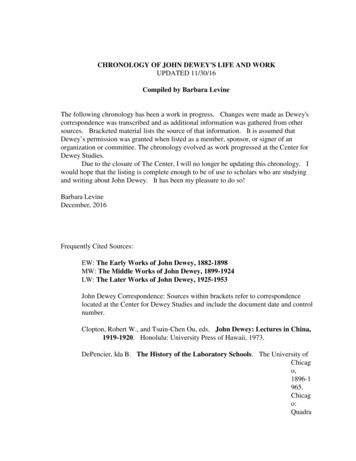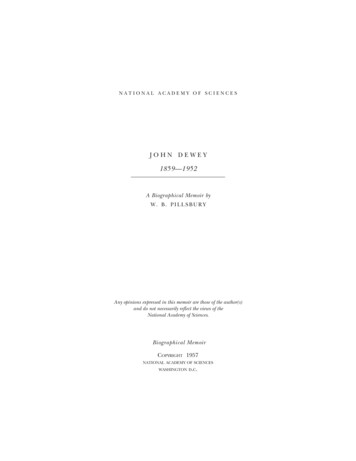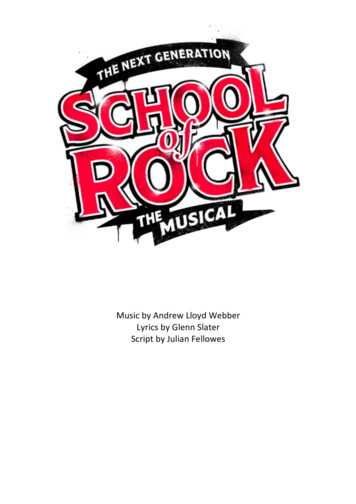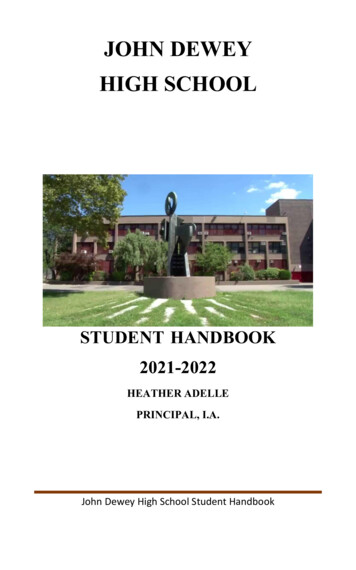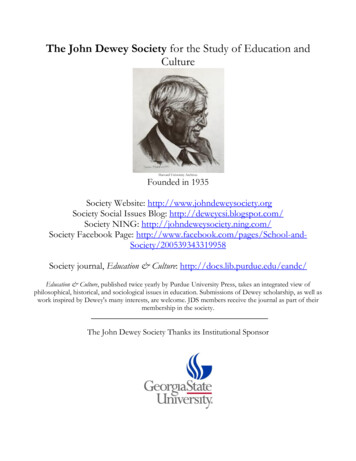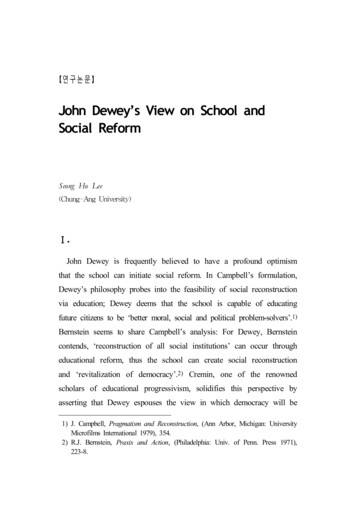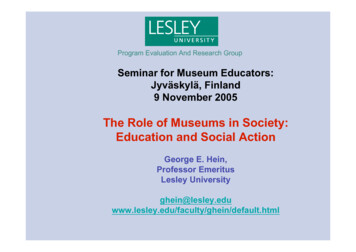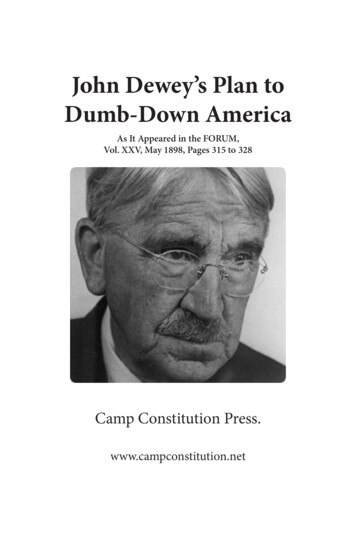
Transcription
John Dewey’s Plan toDumb-Down AmericaAs It Appeared in the FORUM,Vol. XXV, May 1898, Pages 315 to 328Camp Constitution Press.www.campconstitution.net
Preface to John Dewey’s Planto Dumb-Down AmericaBy Samuel BlumenfeldThe dumbing-down of America is no accident. It is not the resultof uncontrollable natural forces floating in the air we breathe or thewater we drink. It is the result of a planned scheme launched in 1898by Progressive-in-Chief John Dewey outlined in an article titled ”ThePrimary-Education Fetich” (sic). Dewey was a diehard socialist witha deep hatred of capitalism, individualism, and orthodox Christianity.He, and his small army of academic followers, were determined toturn America into a humanist collectivist society and he figured outthat the best way to separate Americans from their constitutionalfreedoms and individualism was to dumb them down.And the easiest way to do this was to change the way children weretaught to read in their primary schools. Get rid of intensive phonics,the foundation of language mastery and independent intelligence, andput in its place a “sight” or “look-say” method that teaches childrento read English as if it were Chinese. Have them memorize a sightvocabulary so that they develop a whole-word reflex and cannot seethe phonetic structure of our alphabetic words. Thus they will becomereading disabled, dyslexic, or simply low-level readers.Need proof? Look no further than what happened to the fourRockefeller boys back in the 1920s when John D. Rockefeller Jr.put his four sons—Nelson, Laurence, Winthrop, and David—in theProgressive Lincoln School in New York. As a misguided admirer ofJohn Dewey, Rockefeller donated three million dollars to the schoolwhich then turned his four sons into dyslexics. Mr. Rockefeller’signorance condemned his sons to lives of literary frustration. Yes, theyhad plenty of money, but their life-long reading handicap deprivedthem of the great pleasures of reading.Dewey’s vision of an egalitarian, socialist America was based ona novel written by Unitarian journalist Edward Bellamy, LookingBackward. The novel is a fantasy of America becoming a socialistparadise in the year 2000. Economic planning replaced free-marketcompetition, and Americans became members of a regimentedindustrial army, all paid by the government.Of course, Dewey knew that Americans would not voluntarily give1
up their economic and individual freedoms, so he told his colleagues:“Change must come gradually. To force it unduly would compromiseits final success by favoring a violent reaction.” And so, wholesaledeception became the modus operandi of the progressive movement.We are reprinting Dewey’s article because it is important forAmericans to understand how they’ve been deceived by their socalled educators. The plan to deliberately dumb down the nationhas been hidden from the public for almost 100 years. Reading ittoday is to become finally aware of the deceit and treachery behindthis treasonous conspiracy to destroy the intellect of millions ofAmericans behind the benign façade of Progressive education.When you consider the misery, frustration, despair and humiliationthese teaching methods have caused in millions of American children,it becomes clear that the professional educators behind all of this werediabolically inspired.Can we repair the damage done by Dewey’s plan? Only if the willis there and Americans are willing to face the fact that they have beenbetrayed by their educators.Dewey, of course, is long dead, but his disciples control Americanpublic education, and whether they know it or not they are continuingto implement Dewey’s plan. And we see the results every day. In2007, the National Endowment for the Arts released its report on thedecline of American literacy. Its chairman, Dana Gioia stated:“This is a massive social problem. We are losing the majority ofthe new generation. They will not achieve anything close to theirpotential because of poor reading.”The only way to reverse this situation is to make sure that every childin every American school is taught to read with intensive, systematicphonics. We know how to restore high literacy to America. But isthere the will to do it? Many parents are doing it by homeschoolingtheir own children. But will it be done in the schools? It will bedone only if there is enough of an outcry from concerned parents andcitizens. That is why we urge readers of this article to distribute copiesof it to as many people as possible. If this article is read by millions ofAmericans, it will have an impact that the educators and politicianswill not be able to ignore.2
John Dewey’s Plan toDumb-Down AmericaAs It Appeared in the FORUM,Vol. XXV, May 1898, Pages 315 to 328(Reformatted by Bob Montgomery Thomas, April 30, 2013)The Primary-Education FetichIt is some years since the educational world was more or lessagitated by an attack upon the place occupied by Greek in theeducational scheme. If, however, Greek occupies the place of a fetich,its worshippers are comparatively few in number, and its influenceis relatively slight. There is, however, a false educational god whoseidolaters are legion, and whose cult influences the entire educationalsystem. This is language-study––the study not of foreign language,but of English; not in higher, but in primary education. It is almost anunquestioned assumption, of educational theory and practice both,that the first three years of a child’s school life shall be mainly takenup with learning to read and write his own language. If we add to thisthe learning or a certain amount of numerical combinations, we havethe pivot about which primary education swings. Other subjects maybe taught; but they are introduced in strict subordination.The very fact that this procedure, as part of the natural andestablished course of education, is assumed as inevitable,––oppositionbeing regarded as captious and revolutionary,––indicates that,historically, there are good reasons for the position assigned to thesestudies. It does not follow, however, that because this course was oncewise it is so any longer. On the contrary, the fact, that this mode ofeducation was adapted to past conditions, is in itself a reason why itshould no longer hold supreme sway. The present has its claims. Itis in education, if anywhere, that the claims of the present should becontrolling.To educate on the basis of past surroundings is like adapting anorganism to an environment which no longer exists. The individualis stultified, if not disintegrated; and the course of progress isblocked. My proposition is, that conditions––social, industrial, andintellectual––have undergone such a radical change, that the timehas come for a thoroughgoing examination of the emphasis put upon3
linguistic work in elementary instruction.The existing status was developed in a period when ability to readwas practically the sole avenue to knowledge, when it was the onlytool which insured control over the accumulated spiritual resourcesof civilization.Scientific methods of observation, experimentation, and testingwere either unknown or confined to a few specialists at the upperend of the educational ladder. Because these methods were not free,were not capable of anything like general use, it was not possible topermit the pupil to begin his school career in direct contact with thematerials of nature and of life. The only guarantee, the only criterionof values, was found in the ways in which the great minds of the pasthad assimilated and interpreted such materials. To avoid intellectualchaos and confusion, it was necessary reverently to retrace the stepsof the fathers. The régime of intellectual authority and tradition, inmatters of politics, morals, and culture, was a necessity, where methodsof scientific investigation and verification had not been developed, orwere in the hands of the few. We often fail to see that the dominantposition occupied by book-learning in school education is simply acorollary and relic of this epoch of intellectual development.Ordinary social conditions were congruent with this intellectualstatus. While it cannot be said that, in the formative period of oureducational system in America, authority and tradition were theultimate sources of knowledge and belief, it must be rememberedthat the immediate surroundings of our ancestors were crude andundeveloped. Newspapers, magazines, libraries, art-galleries, andall the daily play of intellectual intercourse and reaction which iseffective to-day were non-existent. If any escape existed from thepoverty of the intellectual environment, or any road to richer andwider mental life, the exit was through the gateway of books. Inpresenting the attainments of the past, these maintained the bonds ofspiritual continuity, and kept our forefathers from falling to the crudelevel of their material surroundings.When ability to read and write marked the distinction betweenthe educated and the uneducated man, not simply in the scholasticsense, but in the sense of one who is enslaved by his environment andone who is able to take advantage of and rise above it, correspondingimportance attached to acquiring these capacities.Reading and writing were obviously what they are still so oftencalled––the open doors to learning and to success in life. All the4
meaning that belongs to these ends naturally transferred itself to themeans through which alone they could be realized. The intensity andardor with which our forefathers set themselves to master reading andwriting, the difficulties overcome, the interest attached in the ordinaryroutine of school-life to what now seems barren,––the curriculum ofthe three R’s,––all testify to the motive-power these studies possessed.To learn to read and write was an interesting, even exciting, thing: itmade such a difference in life.It is hardly necessary to say that the conditions, intellectual aswell as social, have changed. There are undoubtedly rural regionswhere the old state of things still persists. With reference to these,what I am saying has no particular meaning. But, upon the whole, theadvent of quick and cheap mails, of easy and continuous travel andtransportation, of the telegraph and telephone, the establishment oflibraries, art-galleries, literary clubs, the universal diffusion of cheapreading-matter, newspapers and magazines of all kinds and grades,––all these have worked a tremendous change in the immediateintellectual environment. The values of life and of civilization, insteadof being far away and correspondingly inaccessible, press upon theindividual––at least in cities––with only too much urgency andstimulating force. We are more likely to be surfeited than starved:there is more congestion than lack of intellectual nutriment.The capital handed down from past generations, and uponwhose transmission the integrity of civilization depends, is nolonger amassed in those banks termed books, but is in active andgeneral circulation, at an extremely low rate of interest. It is futileto try to conceal from ourselves the fact that this great change inthe intellectual atmosphere––this great change in the relation of theindividual to accumulated knowledge––demands a correspondingeducational readjustment. The significance attaching to reading andwriting, as primary and fundamental instruments of culture, hasshrunk proportionately as the immanent intellectual life of societyhas quickened and multiplied. The result is that these studies losetheir motive and motor force. They have become mechanical andformal, and out of relation––when made dominant––to the rest oflife.They are regarded as more or less arbitrary tasks which must besubmitted to because one is going to that mysterious thing called aschool, or else are covered up and sugar-coated with all manner ofpretty devices and tricks in order that the child may absorb them5
unawares. The complaint made by some, that the school curriculumof today does not have the disciplinary value of the old-fashionedthree R’s, has a certain validity. But this is not because the old idealhas been abandoned. It is because it has been retained in spite ofthe change of conditions. Instead of frankly facing the situation, andasking ourselves what studies can be organized which shall do for today what language-study did for former generations, we have retainedthat as the centre and core of our course of study, and dressed it outwith a variety of pretty pictures, objects, and games, and a smatteringof science.Along with this change in the relation of intellectual material andstimulus to the individual there has been an equally great change inthe method and make-up of knowledge itself. Science and art havebecome free. The simplest processes and methods of knowing anddoing have been worked out to such a point that they are no longerthe monopolistic possessions of any class or guild. They are, inidea, and should be in deed, part of the social commonwealth. It ispossible to initiate the child from the first in a direct, not abstract orsymbolical, way, into the operations by which society maintains itsexistence, material and spiritual.The processes of production, transportation, consumption, etc.,by which society keeps up its material continuity, are conducted onsuch a large and public scale that they are obvious and objective.Their reproduction in embryonic form through a variety of modesof industrial training is entirely within the bounds of possibility.Moreover, methods of the discovery and communication of truth––upon which the spiritual unity of society depends––have becomedirect and independent, instead of remote and tied to the interventionof teacher or book.It is not simply that children can acquire a certain amount ofscientific information about things organic and inorganic: if that wereall, the plea for the study of the history and literature of the past, asmore humanistic, would be unanswerable. No; the significant thingis that it is possible for the child at an early day to become acquaintedwith, and to use, in a personal and yet relatively controlled fashion,the methods by which truth is discovered and communicated,and to make his own speech a channel for the expression andcommunication of truth; thus putting the linguistic side where itbelongs––subordinate to the appropriation and conveyance of whatis genuinely and personally experienced.6
A similar modification, almost revolution, has taken place in therelation which the intellectual activities bear to the ordinary practicaloccupations of life. While the child of bygone days was getting anintellectual discipline whose significance he appreciated in the school,in his home life he was securing acquaintance in a direct fashion withthe chief lines of social and industrial activity. Life was the mainrural. The child came into contact with the scenes of nature, and wasfamiliarized with the care of domestic animals, the cultivation of thesoil, and the raising of crops. The factory system being undeveloped,the home was the centre of industry. Spinning, weaving, themaking of clothes, etc., were all carried on there. As there was littleaccumulation of wealth, the child had to take part in these, as wellas to participate in the usual rounds of household occupations. Onlythose who have passed through such training, and, later on, haveseen children reared in city environments, can adequately realizethe amount of training, mental and moral, involved in this extraschool life. That our successful men have come so largely from thecountry, is an indication of the educational value bound up withsuch participation in this practical life. It was not only an adequatesubstitute for what we now term manual training, in the developmentof the hand and eye, in the acquisition skill and deftness; but it wasinitiation into self-reliance, independence of judgment and action,and was the best stimulus to habits of regular and continuous work.In the urban and suburban life of a child to-day this is simply amemory. The invention of machinery; the institution of the factorysystem; the division of labor; have changed the home from a workshopinto a simple dwelling-place. The crowding into cities and theincrease in servants have deprived the child of an opportunity to takepart in those occupations which still remain. Just at the time whena child is subjected to a great increase in stimulus and pressure fromhis environment, he loses the practical and motor training necessaryto balance his intellectual development. Facility in acquiringinformation is gained: the power of using it is lost. While need of themore formal intellectual training in the school has decreased, therearises an urgent demand for the introduction of methods of manualand industrial discipline which shall give the child what he formerlyobtained in his home and social life.Here we have at least a prima facie case for reconsideration ofthe whole question of the relative importance of learning to readand write in primary education. Hence the necessity of meeting the7
question at closer quarters. What can be said against giving up thegreater portion of the first two years of school life to the mastery oflinguistic form? In the first place, physiologists are coming to believethat the sense organs and connected nerve and motor apparatus of thechild are not at this period best adapted to the confining and analyticwork of learning to read and write. There is an order in which sensoryand motor centres develop,––an order expressed, in a general way, bysaying that the line of progress is from the larger, coarser adjustmentshaving to do with the bodily system as a whole (those nearest thetrunk of the body) to the finer and accurate adjustments having to dowith the periphery and extremities of the organism. The oculist tellsus that the vision of the child is essentially that of the savage; beingadapted to seeing large and somewhat remote objects in the mass––not near-by objects in detail. To violate this law means undue nervousstrain: it means putting the greatest tension upon the centres leastable to do the work. At the same time, the lines of activity which arehungering and thirsting for action are left, unused, to atrophy. The actof writing–– especially in the barbarous fashion, long current in theschool, of compelling the child to write on ruled lines in a small handand with the utmost attainable degree of accuracy––involves a nicetyand complexity of adjustments of muscular activity which can onlybe appreciated by the specialist. As the principal of a Chicago schoolhas wittily remarked in this connection, “The pen is literally mightierthan the sword.” Forcing children at a premature age to devote theirentire attention to theses refined and cramped adjustments has leftbehind a sad record of injured nervous systems and of musculardisorders and distortions. While there are undoubted exceptions,present physiological knowledge points to the age of about eight yearsas early enough for anything more than an incidental attention tovisual and written language-form.We must not forget that these forms are symbols. I am far fromdepreciating the value of symbols in our intellectual life. It is hardlytoo much to say that all progress in civilization upon the intellectualside has depended upon increasing invention and control of symbolsof one sort or another. Nor do I join in the undiscriminating cry ofthose who condemn the study of language as having to do with merewords, not with realities. Such a position is one-sided, and is as crudeas the view against which it is a reaction. But there is an importantquestion here: Is the child of six or seven years ready for symbols tosuch an extent that the stress of educational life can be thrown upon8
them? If we were to look at the question independently of the existingschool system, in the light of the child’s natural needs and interests atthis period, I doubt if there could be found anyone who would saythat the urgent call of the child of six and seven is for this sort ofnutriment, instead of for more direct introduction into the wealth ofnatural and social forms that surrounds him. No doubt the skilfulteacher often succeeds in awakening an interest in these matters; butthe interest has to be excited in a more or less artificial way, and, whenexcited, is somewhat factitious, and independent of other-interests ofchild-life. At this point the wedge is introduced and driven in, whichmarks the growing divorce between school and outside interests andoccupations.We cannot recur too often in educational matters to the conceptionof John Fiske, that advance in civilization is an accompaniment of theprolongation of infancy. Anything which, at this period, develops to ahigh degree any set of organs and centres at the expense of others meanspremature specialization, and the arrest of an equable and all-arounddevelopment. Many educators are already convinced that prematurefacility and glibness in the matter of numerical combinations tendtoward an arrested development of certain higher spiritual capacities.The same thing is true in the matter of verbal symbols. Only thetrained psychologist is aware of the amount of analysis and abstractiondemanded by the visual recognition of a verbal form. Many supposethat abstraction is found only where more or less complex reasoningexists. But as a matter of fact the essence of abstraction is found incompelling attention to rest upon elements which are more or less cutoff from direct channels of interest and action. To require a child toturn away from the rich material which is all about him, to which hespontaneously attends, and which is his natural, unconscious food,is to compel the premature use of analytic and abstract powers. It iswillfully to deprive the child of that synthetic life, that unconsciousunion with his environment, which is his birthright and privilege.There is every reason to suppose that a premature demand uponthe abstract intellectual capacity stands in its own way. It cripplesrather than furthers later intellectual development. We are not yet ina position to know how much of the inertia and seeming paralysis ofmental powers in later periods is the direct outcome of excessive andtoo early to appeal to isolated intellectual capacity. We must trust tothe development of physiology and psychology to make these mattersso clear that school authorities and the public opinion which controls9
them shall have no option. Only then can we hope to escape thatdeadening of the childish activities which led Jowett to call education“the grave of the mind.”Were the matter not so serious it would be ludicrous, when wereflect all this time and effort to reach the end to which they arespecially consecrated. It is a common saying among intelligenteducators that they can go into a schoolroom and select the childrenwho picked up reading at home: they read so much more naturallyand intelligently. The stilted, mechanical, droning, and sing-song waysof reading which prevail in many of our schools are simply the reflexof the lack of motive. Reading is made an isolated accomplishment.There are no aims in the child’s mind which he feels he can serveby reading; there is no mental hunger to be satisfied; there are noconscious problems with reference to which he uses books. The bookis a reading-lesson. He learns to read not for the sake of what hereads, but for the mere sake of reading. When the bare process ofreading is thus made an end in itself, it is a psychological impossibilityfor reading to be other than lifeless.It is quite true that all better teachers now claim that the formalact of reading should be made subordinate to the sense of what isread, that the child has first to grasp the idea, and then to expresshis mental realization. But, under present conditions, this professioncannot be carried out. The following paragraph from the report of theCommittee of Fifteen on elementary education states clearly enoughthe reason why; though, as it seems to me, without any consciousnessof the real inference which should be drawn from the facts set forth:“The first three years’ work of the child is occupied mainly with themastery of the printed and written forms of the words of his colloquialvocabulary,––words that he is already familiar enough with as soundsaddressed to the ear. He has to become familiar with the new formsaddressed to the eye; and it would be an unwise method to requirehim to learn many new words at the same time that he is learning torecognize his old words in their new shape. But as soon as he hasacquired (before three years) some facility in reading what is printedin the colloquial style, he may go on to selections from standardauthors.”The material of the reading-lesson is thus found wholly in theregion of familiar words and ideas. It is out of the question for thechild to find anything in the ideas themselves to arouse and holdattention. His mind is fixed upon the mere recognition and utterance10
of the forms. Thus begins that fatal divorce between the substanceand the form of expression, which, fatal to reading as an art, reducesit to a mechanical action. The utter triviality of the contents of ourschool “Primers” and” First Readers,” shows the inevitable outcomeof forcing the mastery of external language-forms upon the childat a premature period. Take up the first half-dozen or dozen suchbooks you meet with, and ask yourself how much there is in the ideaspresented worthy of respect from any intelligent child of six years.Methods for learning to read come and go across the educationalarena, like the march of supernumeraries upon the stage. Each isheralded as the final solution of the problem of learning to read; buteach in turn gives way to some later discovery. The simple fact is––that they all lack the essential of any well-grounded method, namely,relevancy to the child’s mental needs. No scheme for learning to readcan supply this want. Only a new motive--putting the child into avital relation to the materials to be read––can be of service here. Itis evident that this condition cannot be met, unless learning to readbe postponed to a period when the child’s intellectual appetite ismore consciously active, and when he is mature enough to deal morerapidly and effectively with the formal and mechanical difficulties.The endless drill, with its continual repetitions, is another instanceof the same evil. Even when the attempt is made to select materialwith some literary or historic worth of its own, the practical outcomeis much like making Paradise Lost the basis of parsing-lessons,or Caesar’s Gallic Wars an introduction to Latin syntax. So muchattention has to be given to the formal side that the spiritual valueevanesces. No one can estimate the benumbing and hardening effectof this continued drill upon mere form. Another even more seriousevil is the consequent emptiness of mind induced. The mental roomis swept and garnished--and that is all. The moral result is even moredeplorable than the intellectual. At this plastic period, when imageswhich take hold of the mind exercise such suggestive motor force,nothing but husks are provided. Under the circumstances, our schoolsare doing great things for the moral education of children; but allefforts in this direction must necessarily be hampered and discounteduntil the school-teacher shall be perfectly free to find the bulk ofthe material of instruction for the early school-years in somethingwhich has intrinsic value,––something whose introduction intoconsciousness is so vital as to be personal and reconstructive.It should be obvious that what I have in mind is not a Philistine11
attack upon books and reading. The question is not how to getrid of them, but how to get their value,––how to use them to theircapacity as servants of the intellectual and moral life. The plea for thepredominance of learning to read in early school-life because of thegreat importance attaching to literature seems to me a perversion. Justbecause literature is so important, it is desirable to postpone the child’sintroduction to printed speech until he is capable of appreciating anddealing with its genuine meaning. Now, the child learns to read asa mechanical tool, and gets very little conception of what is worthreading. The result is, that, after he has mastered the art and wishesto use it; he has no standard by which to direct it. He is about aslikely to use it in one way as in another. It would be ungrateful notto recognize the faithfulness and relative success with which teachers,for the last ten or fifteen years, have devoted themselves to raisingthe general tone of reading with their pupils. But, after all, they areworking against great odds. Our ideal should be that the child shouldhave a personal interest in what is read, a personal hunger for it, and apersonal power of satisfying this appetite. The adequate realization ofthis ideal is impossible until the child comes to the reading-materialwith a certain background of experience which makes him appreciatethe difference between the trivial, the merely amusing and exciting,and that which has permanent and serious meaning. This is impossibleso long as the child has not been trained in the habit of dealing withmaterial outside of books, and has formed, through contact withthe realities of experience, habits of recognizing and dealing withproblems in the direct personal way. The isolation of material foundin books from the material which the child experiences in life itself––the forcing of the former upon the child before he has well-organizedpowers of dealing with the latter––is an unnatural divorce whichcannot have any other result than defective standards of appreciation,and a tendency to elevate the sensational and transiently interestingabove the valuable and the permanent.Two results of our wrong methods are so apparent in highereducation that they are worth special mention. They are exhibited inthe par
Nov 01, 2013 · by Progressive-in-Chief John Dewey outlined in an article titled ”The Primary-Education Fetich” (sic). Dewey was a diehard socialist with a deep hatred of capitalism, individualism, and orthodox Christianity. He, and his small army of academic followers, were determined to turn America into a humanist
